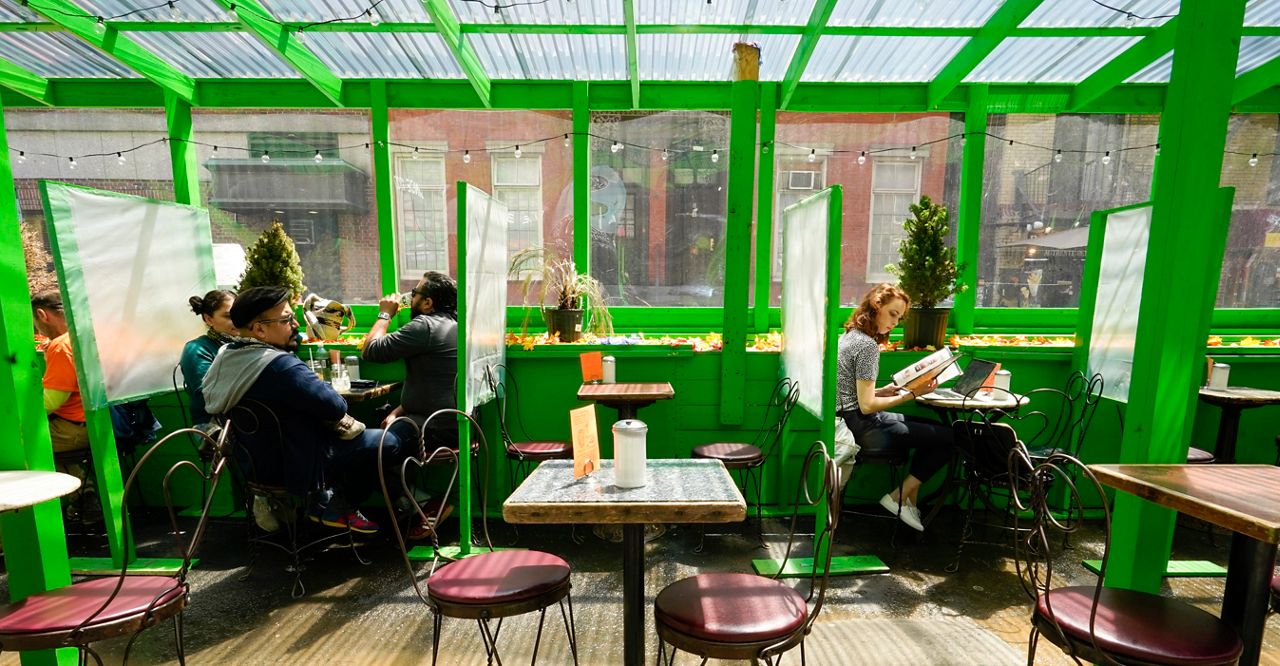NEW YORK — The City Council passed legislation Thursday that sets the stage for city lawmakers to create a permanent outdoor dining program.
The zoning change approved by the council removes restrictions that prior to the pandemic largely confined outdoor dining to Manhattan.
In 2020, the de Blasio administration enacted an emergency program to allow restaurants across the city to more easily establish outdoor dining setups, including in areas where outdoor dining had been restricted.
The passage of the bill now allows city lawmakers to create a new outdoor dining program governing where restaurants can put their dining setups, what those setups will be permitted to look like and which agency will enforce the rules.
“This is the first step in establishing a permanent outdoor dining program that balances the many considerations of neighborhoods to ensure the needs of these critical small businesses are aligned with the quality-of-life needs of our neighborhoods,” Speaker Adrienne Adams said at the Thursday meeting.
During a lengthy council hearing earlier this month, the city’s Department of Transportation, which might end up overseeing the new program, indicated that the sheds that have become ubiquitous in parts of the city would no longer be allowed.
Officials said an overhauled program would make outdoor dining more readily available in all five boroughs.
Before the pandemic, 1,004 of the city’s 1,416 licensed sidewalk cafés were located in Manhattan, according to city officials.
As of Feb. 1, there were 12,124 restaurants participating in the Open Restaurants program, with 5,909 in Manhattan, 659 in the Bronx, 2,955 in Brooklyn, 2,414 in Queens and 187 in Staten Island, according to officials.
“We’re bringing fairness to New Yorkers,” Councilman Rafael Salamanca, chair of the Committee on Land Use and a sponsor of the bill, said prior to the 46-3 vote. “When you look at the maps prior to COVID, prior to what the mayor signed in terms of the executive orders, not all communities in the city of New York had access to sidewalk cafes.”
City leaders have dealt with strong pushback from opponents of the program, who claim the outdoor dining sheds have led to noise issues, an exploding rat population and loss of parking spaces.
Councilwoman Marjorie Velázquez, the primary sponsor of the bill, emphasized that more community input will be obtained in the coming months as they finalize details of the upcoming bill.
“Our communities need to feel like they are being heard, and that is why we are saying, ‘We are not seeking perfection, we’re seeking participation and partnership, and that process begins today,” Velázquez, chair of the Committee on Consumer and Worker Protection, said a news conference.
Velázquez toured parts of Lower Manhattan and Chelsea earlier in the day on Thursday with fellow Councilman Christopher Marte. Marte said at the council meeting that they saw “five-feet-tall piles of trash, dead rats, abandoned and broken sheds, cars and bikes not being able to go down the street, and puddles of sludge—we think it's sludge—it might be worse.”
Councilman Kalman Yeger, who voted against the bill, said he did not think the Department of Transportation would be able to adequately enforce outdoor dining guidelines.
“The bill pending here in this council will put the enforcement of this program in the hands of the DOT – the DOT that can’t get a speed bump put in your neighborhood on any block you want in under three years,” Yeger said.



